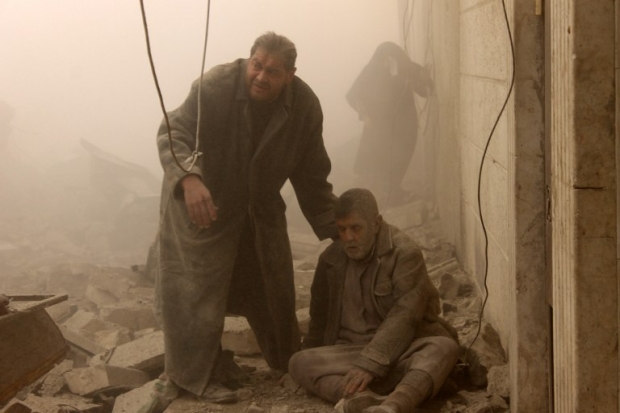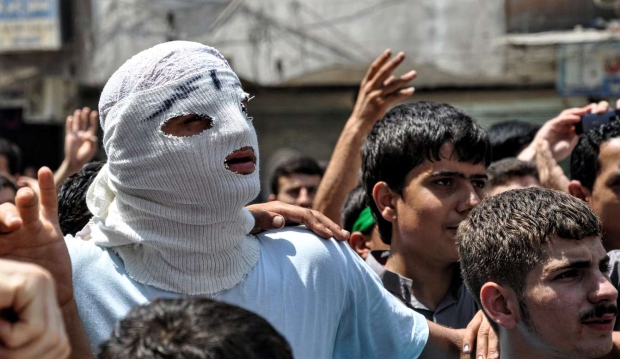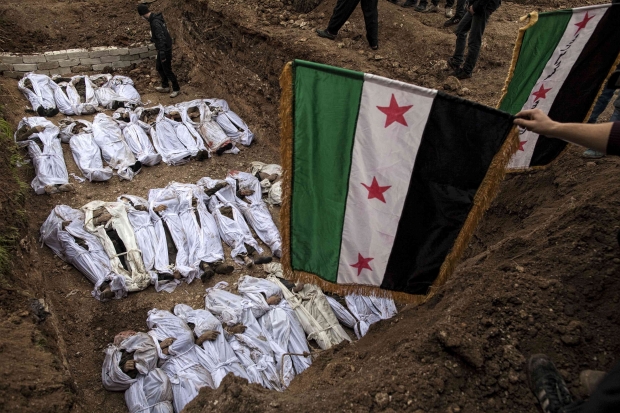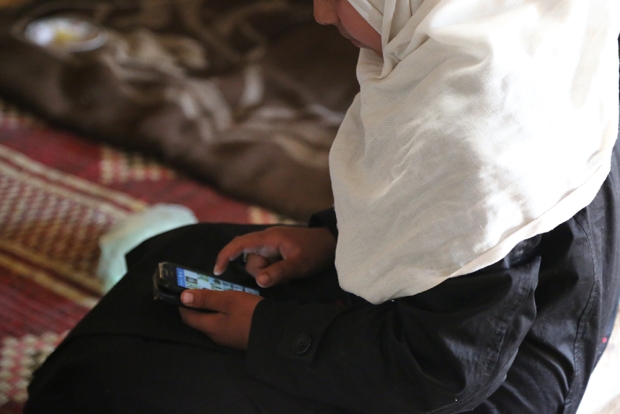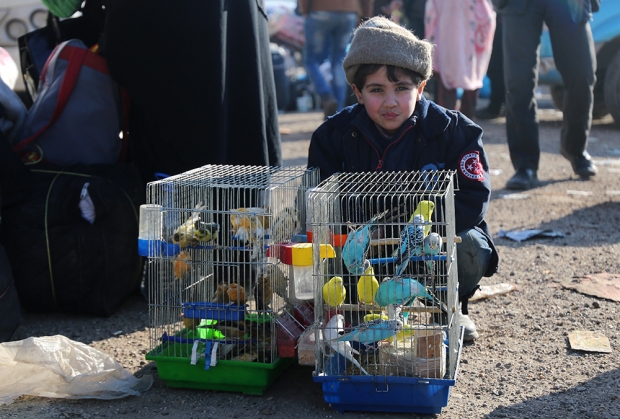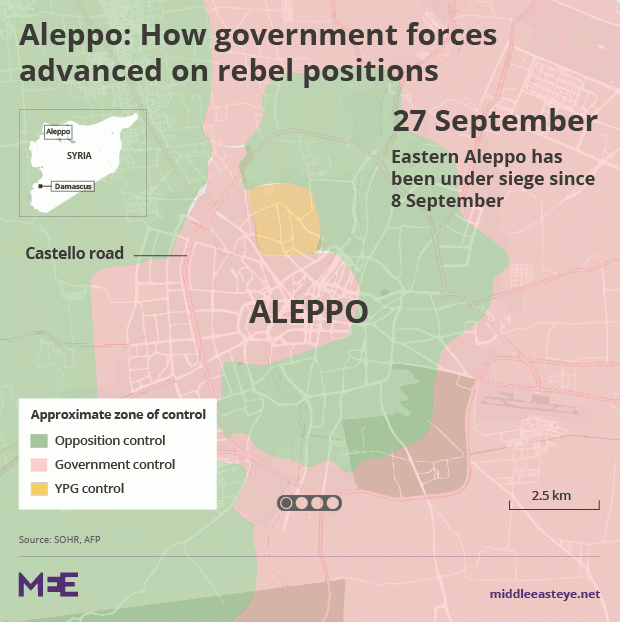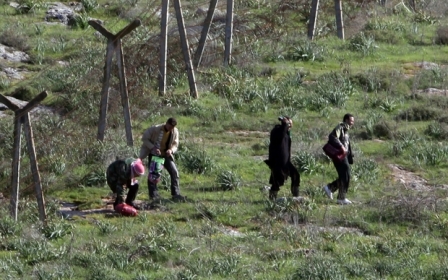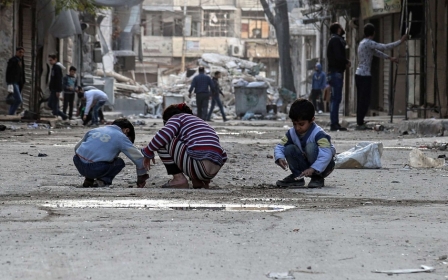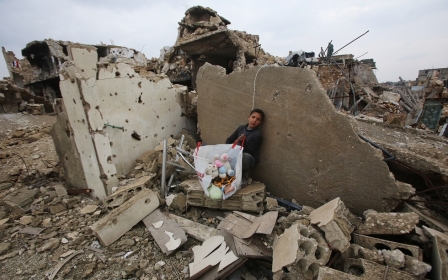Orphan, teenager, widow: One girl's tale of survival in Aleppo
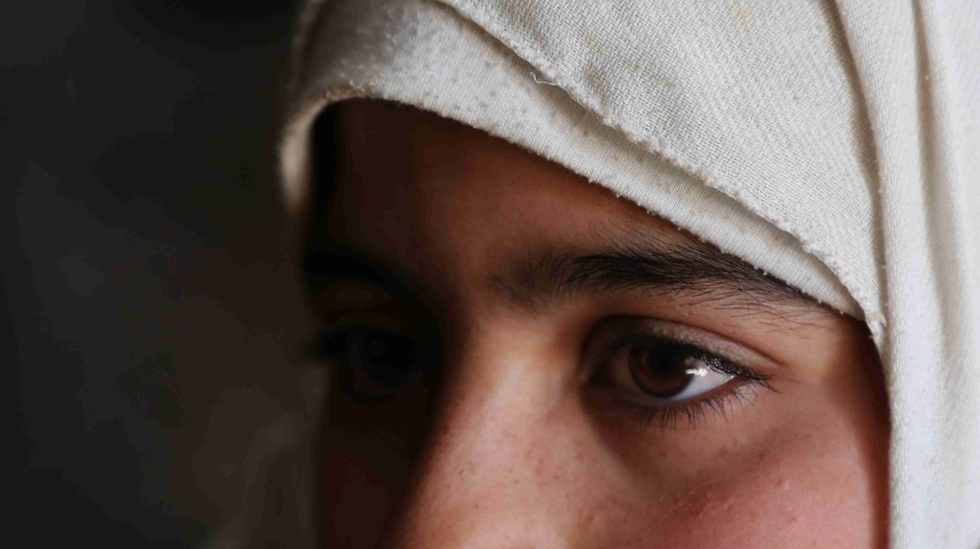
From a distance of more than half a decade of war and loss, the memories that 16-year old Hala clings to most from her early childhood in Aleppo are the mundane routines of family life and childhood. Going to school. Playing with her three younger brothers and sister. Even the occasional arguments her parents would have about money.
Hala's father, Hosam, worked hard as a taxi driver to support the family, but times were hard and frustrations simmered in the al-Mashad district where they lived in on the eastern side of Syria's second city.
One day, the police broke into our home and took my father during the middle of the night
- Hala
"One day, the police broke into our home and took my father during the middle of the night. We were all crying and my mother was in shock," recalls Hala, who did not want to give her full name.
"I remember saying: 'Please leave him alone, don't kill him… leave him, he has done nothing,' but, poor dad, they took him and my mum didn't stop sobbing all through the night and the next day.
"She called my uncles to go and check on him, but they couldn't get any information. The police just told them to forget about him."
The first sound of bombs
For the next three months, Hala and her family heard nothing of Hosam as the demonstrations outside grew larger and louder and the clashes grew fiercer.
Then, finally - Hala recalls that her mother Esraa was reading the Quran and the children were eating their lunch - they heard a knock at the door. It was Hosam, pale and skinny from his time in prison.
"I fell on the ground and started crying, shouting to my mum: 'Dad is here! Dad is here!'"
By 2012, living a normal life in Aleppo had become impossible. "There were demonstrations everywhere, even many times in our schools," says Hala. Her father took her out of school and the children passed the time most days at home with their mother.
The warplanes were shelling nearby. It was so close. It is something that became a normal part of day-to-day life, we simply got used to it
- Hala
And then during Ramadan, Hala was awoken by the sound of people screaming in the street.
"Everyone was leaving their homes and going out onto the streets with their packed luggage and walking," she says.
"The warplanes were shelling nearby. It was so close. That was the first time we saw and experienced the shelling and bombing. It is something that became a normal part of day-to-day life, we simply got used to it."
Death of a father
The family left for a few days to stay with relatives as Free Syrian Army (FSA) fighters took control of the streets and launched attacks on government forces. When they returned, they found FSA fighters occupying their house.
Hosam returned to his taxi work, but his involvement with the opposition played on his wife's mind. One day, Hosam was returning to the then-rebel-controlled Bustan al-Qasr neighbourhood in eastern Aleppo from the government-controlled side of the city when he was stopped and questioned by police.
After three days, a friend told the family that Hosam was being held in western Aleppo.
"We were completely devastated because we knew that my dad had been in jail before and we realised they would not let him out because of his activities," recalls Hala.
"It was one of the most horrid days of my life. I thought my dad won't come to see us ever again."
Then my mum got a call from our old neighbour. 'He is dead, we found your husband's body,' she said.
- Hala
In January 2013, the family heard news of a massacre near Bustan al-Qasr, where executed civilians were found floating in the river that now divided the city into two sides. For nearly a week, bodies kept appearing in the water.
"We didn't think that my dad could be among the dead," says Hala. "Then my mum got a call from our old neighbour. 'He is dead, we found your husband's body,' she said."
Hala's mom collapsed sobbing. "She told me: 'Take care of your brothers until I get back.' I begged her to tell me what had happened, but she said nothing."
Yet from the look in her mother's eyes, Hala knew that her father was dead. A few hours later her mother returned to the house. "He was shot right in the head," Hala recalls her as saying.
At least 68 bodies were eventually recovered, all killed by single gunshots to the head or neck, according to reports citing FSA officials. The Syrian government denied the killings and said "terrorist groups" were responsible.
Marriage in wartime
Hosam's death also left the family without any source of income. Just two weeks later and despite being only 13 years old, Hala agreed to marry at her mother's request. Her husband Khaled, who was 25 and worked at a phone shop in the Ferdous neighbourhood, was known to her uncle but Hala had never met him before.
Sonia Khush, Syria director for the Save the Children, an international charity, told MEE that child marriage was a growing problem in Syria and refugee communities as families and communities were "pushed to the brink" by the brutality of the country's war.
"In these grave circumstances, where one or both parents could have been killed or injured, girls and their families often see getting married as one of the only ways to alleviate the financial burden."
Kush says that many families feel they cannot protect their daughters from kidnappings, sexual assaults and rapes and hope that, by finding them a husband, they will be better protected and have a better life.
Suddenly I became mum and dad to my brothers, They had no one to stay with but me. The bombs and the attacks kept going on our street
- Hala
"Whatever the reasons, however, the sad fact is that even once this war is over, many girls who have been married off will never be able to get their childhood back. They will not be able to return to school, and may have already become mothers far too young."
Hala moved into a house with Khaled close to where her family lived. One day in mid-September 2013, she was visiting them while her husband was at work. A rocket hit the building as her mother prepared food in the kitchen. Hala and her brothers fell to the floor - but the room where her mother was suffered the full force of the blast.
"She was covered in blood, all over her chest and body," says Hala, referring to her mother. "She died instantly when a big piece of metal hit her heart and killed her."
At the time Hala was a few weeks pregnant but the shock of the attack caused her to miscarriage, she learned later at the hospital.
"Suddenly I became mum and dad to my brothers," she says. "They had no one to stay with but me. The bombs and the attacks kept going on our street. The whole city was being hit constantly."
But despite the constant danger, Hala did not want to leave the city. "I couldn't because my dad and mum are buried here," she says. "How could I bear being away from them? I couldn't."
Flight from Aleppo
In 2015, the area again found itself the target of devastating air strikes. "The neighbour shouted to us to get down to the basement," says Hala. "We got down, but it wasn't safe enough and the building collapsed. It was a massive rocket."
"Homeless, with no parents or husband and a dead sister and dead baby, and I am just 16 years old. These are my memories and my life right now," said Hala.
Hala and her brothers were put up in a house by her mother-in-law's family and survived thanks to the kindness and charity of their neighbours.
Along with tens of thousands of other residents they were eventually evacuated from Aleppo in December 2016 as part of a deal which returned the eastern part of the city to government control.Six months on, Hala and her brothers live in a camp for orphans in Idlib province, studying for an uncertain future as the Syrian war continues to shift around them.
"I love my brothers and will stay with them to protect and raise them properly," she says. "Like my mum did for me when I was their age."
Stay informed with MEE's newsletters
Sign up to get the latest alerts, insights and analysis, starting with Turkey Unpacked
Middle East Eye delivers independent and unrivalled coverage and analysis of the Middle East, North Africa and beyond. To learn more about republishing this content and the associated fees, please fill out this form. More about MEE can be found here.


